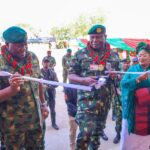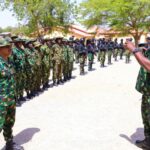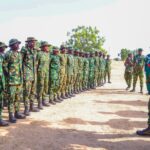Ghana is planning to spend about $15 million (GH¢294.5m) to vaccinate the initial 20 million people.
The summary budget covers operational costs for phase one of the three-phase National Vaccine Deployment Plan (NVDP) for COVID-19.
Presenting highlights of the plan, in Accra, last Friday, at a webinar organised by the Centre for Social Justice to create awareness of the NVDP, the Programme Manager of the Expanded Programme on Immunisation (EPI) of the Ghana Health Service (GHS), Dr. Kwame Amponsa-Achiano, said an estimated $3 would be spent on each person to be vaccinated.
Dr. Amponsa-Achiano said the exercise would be in three phases, with the first phase constituting a segmented group of 20 million people.
According to him, “Distribution strategies will initially be based on segmentation of the population based on vulnerabilities. But the ultimate is the entire population. The initial target is 20 million people,” he said. He maintained that beneficiaries under the first phase included health workers, people with known underlying health conditions and security personnel
The second phase, he said, would cover other essential service providers, people above 60 years, second-cycle and tertiary students, all teachers, members of the three arms of government and the media.
He added that phase three would involve other members of the population, except children under 16 and pregnant women He indicated, however, that the programme would be expanded to include children under 16 and pregnant women over time when more safety information became available.
The programme manager explained that since the plan was a living document, it was subject to reviews and updates when they became necessary.
Dr. Amponsa-Achiano, in a breakdown,said the estimate covered additional cold chain facilities that would be needed for storage.
Breaking down the budget, he said the items on the budget included coordination, estimated to cost $2.26 million; communication, costing $795,106; logistics and waste management, costing $24.78 million; training and service delivery, costing $21.02 million, and data management, monitoring and evaluation, costing $1.1 million.
Additionally, he said, disease surveillance and safety monitoring were estimated at $1.63 million, while operational research would cost $81,125.
Although the three-phase exercise was planned to start on April 14 and end on October 20, this year, Dr. Amponsa-Achiano said the exercise would now start two weeks earlier due a charge by President Nana Addo Dankwa Akufo-Addo for it to be pushed forward.
He continued, “Initially, we proposed those dates, but based on the President’s vision, they have been revised to start two weeks before the scheduled time, meaning it will start in March, instead of April, all things being equal..
He pointed out that the first two phases would travel two rounds each, within two months, each round lasting at least 14 days.
Dr. Amponsa-Achiano said the deployment would be done within the existing healthcare infrastructure through the EPI under the GHS.
There would be 12,471 vaccinators and 37,413 volunteers, while 2,079 team supervisors would be deployed for the exercise, he said.
The EPI Manager said the execution strategy included the use of existing public and private health facilities; the outreach strategy, where vaccinators would go into communities to vaccinate, and the camp-out method, usually used for island communities, where vaccinators pitched camp until all the target population was vaccinated before leaving.
He said vaccination against the COVID-19 was an additional preventive measure to complement other interventions, such as the preventive protocols.
“There is the likelihood of the demand for proof of COVID-19 vaccination for international travels and engagements in the future. It will contribute to a reduction in COVID-19 morbidity and mortality, reduce disruptions in social, economic and educational functions and enhance the mental and psycho-social well-being of the Ghanaian population,” he said.
President Nana Akufo-Addo, in his 20th address to the nation on the COVID-19, had given an assurance that the government would ensure that the COVID-19 vaccines to be deployed in the country were effective and safe.
On Sunday, January 31, this year, he said the country was expected to receive its first consignment of the vaccines in March 2021.
He said, however, that through bilateral and multilateral means, “we are hopeful that, by the end of June, a total of 17.6 million vaccine doses would have been procured for the Ghanaian people”.
According to him, the target was to vaccinate “the entire population, with an initial target of 20 million people”.
The World Bank has estimated that Ghana will need a minimum of $180 million to procure vaccines that can cover 60 per cent of its population.
The Minister-designate for Health, Mr. Kwaku Agyemang-Manu, told Parliament’s Appointments Committee last Monday that the country had ordered 355,000 doses of COVID-19 vaccines.







